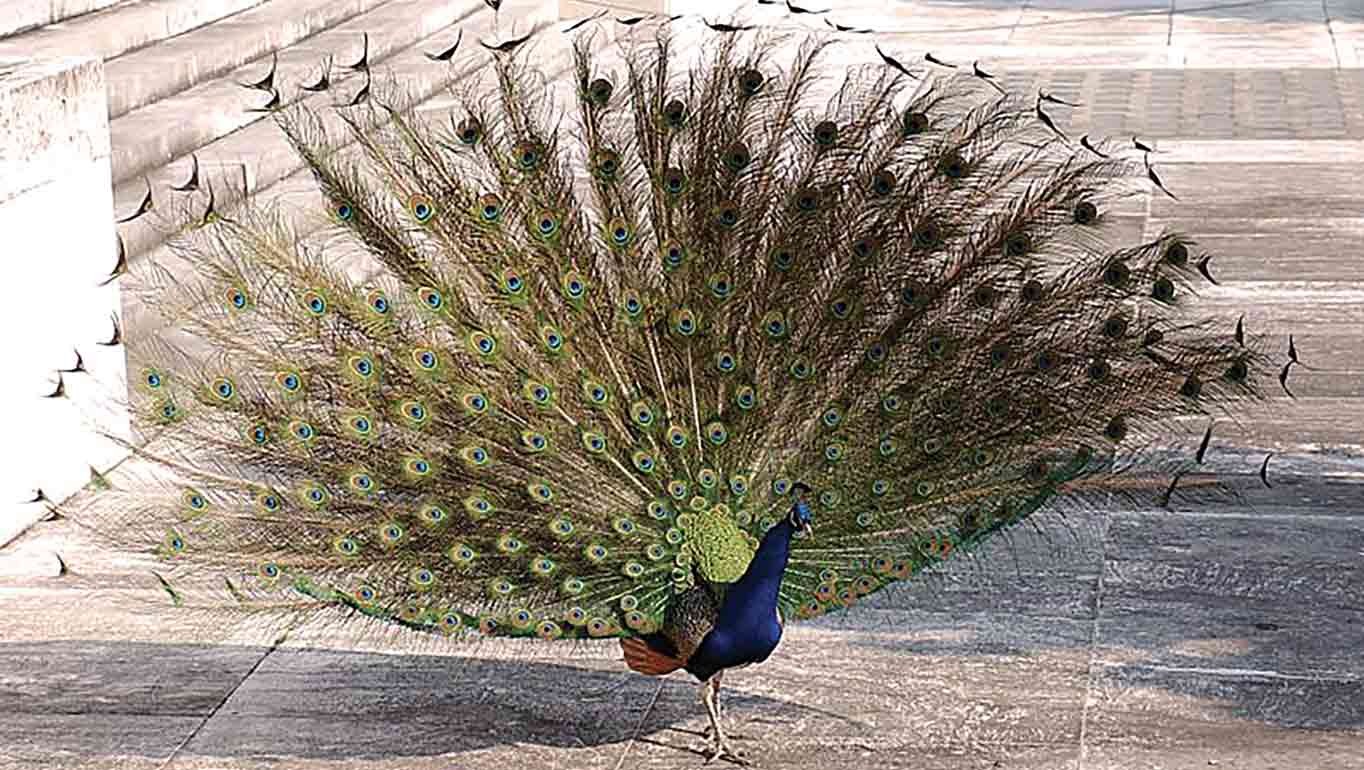The peacocks seem out of place strutting around the grounds of the Palais des Nations in their colorful and feathery regalia. They are quite friendly and often approach visitors with a curious expression from their beady eyes and elongated necks. One may be forgiven for thinking that I’m writing about delegates from some faraway country, but these characters are born and bred Geneva natives.
In 1890, Swiss archeologist and art collector, Gustave Revilliod, bequeathed his estate on Varembé to the city of Geneva under several conditions: to create a park named after his mother, Ariana, for the enjoyment of the city’s residents, to be buried on the grounds, and to allow his beloved peacocks to roam freely in the gardens. To this day, peacocks still live in Ariana Park, which is now the location of the United Nations Office in Geneva.
Two of the peacocks living at UNOG headquarters today are the descendants of peacocks donated by a Japanese zoo in 1997. “We currently have two males, plus a third, who´s more of a loner. He lives near the Bocage building and the other two can be seen around the main courtyard,” explained Pierre Duperret, who has worked as a gardener at the UN since 2002. Along with a team of three other gardeners plus a supervisor, Mr. Duperret is responsible for tending to the gardens as well as caring for the creatures that live in it.
According to Mr. Duperret, the lush gardens of Ariana Park are ideally suited for peacocks, since they provide plenty of things to eat. “They eat seeds, insects, worms, flowers, as well as small plants and grass. We also give them poultry feed,” added Mr. Duperret. “It’s not specifically for peacocks because peacocks are fowl. This complements their diet. We feed them more in winter because there are fewer things to eat in the gardens.” Besides food, Ariana Park also provides the peacocks with shelter. They can often be found sleeping on the crowns of the cedar trees overlooking Lake Geneva.
This lofty perch protects the peacocks from predators that prowl the grounds of the park. “We had a peahen, but unfortunately, she was eaten by a fox.” Mr. Duperret noted sadly. “Peahens are quite vulnerable, because when a peahen lays eggs, she will stay on the ground to protect her eggs. She won´t fly away, so she’s very vulnerable.” While there are currently no peahens or peachicks living on the grounds of the UN, Mr. Duperret pointed out that peacocks usually live in clans and that cohabitation isn’t always easy.
“Males can be territorial and have a hard time sharing their territory with other males. Two of the peacocks are brothers. They´ve always lived together, so they tolerate each other. You can have several males living together, but one will always be the dominant male. In fact, in spring, the peacocks engage in what we call a parade. It’s pretty incredible! They walk side by side, in parallel lines, for 20 or 30 meters and then they walk back, while looking at each other the entire time. Sometimes it lasts 10 to 15 minutes. They continue to challenge each other until one of them asserts his dominance.”
In general, the peacocks live a peaceful and happy existence on the grounds of the park. “It’s their home,” said Mr. Duperret. “They like it here, I think. The mother and sister of the two brothers escaped to the mission of Kuwait. The males them chased away. We don´t know why. We had to go get them, and it wasn’t easy. Peacocks are hard to catch. They weigh about five kilos, and their legs are very powerful. A peacock can jump up to two meters into the air. It’s impressive!” Despite the rescue mission´s success, however, the two peahens fled the UN complex again on the following day.
“They didn´t have their grounds passes,” joked Mr. Duperret. On a more serious note, he added: “I think that nature is like that, and we shouldn’t force things.” Mr. Duperret´s words convey nothing if not his profound devotion for Ariana Park and its wildlife. During our interview, he described the park as “magnificent,” “wonderful,” and a “gem”. Nevertheless, he mentioned that visitors sometimes leave rubbish or trample the flowers, which grow naturally on the lawns and are important for bees as well as other pollinating insects. The problem is especially acute during the warmer months of the year, when the sunshine beckons staff members to come out and picnic on the sprawling lawns.
“I think that people should respect the park more,” he concludes. “Nature takes care of itself. It´s been taking good care of itself for millions of years. It´s up to us not to litter or trample the flowers.” If the UN peacocks could hear him, I´m sure they would cock their royal blue heads in feathery agreement. Taking good care of our beloved park and its creatures will ensure that staff members continue to enjoy its natural beauty and splendor for generations to come.



